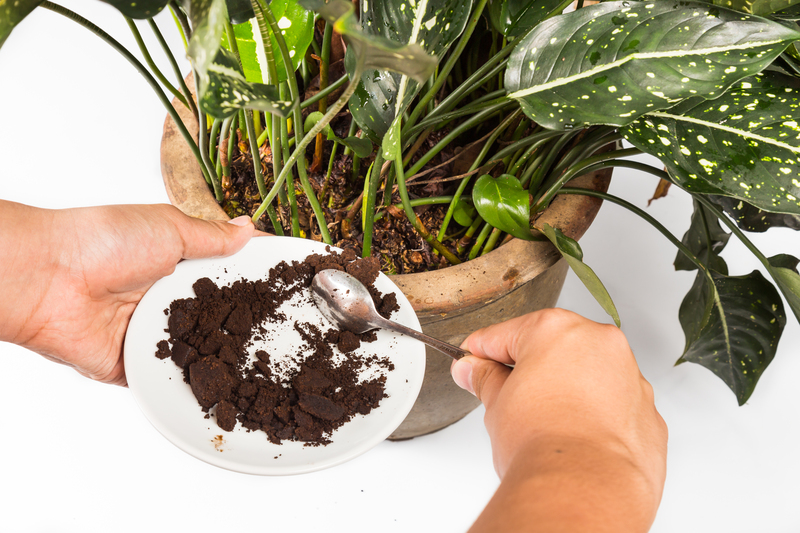Organic Waste: A Path to Soil Renewal
Posted on 21/06/2025
Organic Waste: A Path to Soil Renewal
In an era of increasing environmental awareness, managing organic waste has garnered significant attention. Not only does proper handling reduce landfill waste, but it also provides a promising route for soil restoration. By transforming organic waste into nutrient-rich amendments, we embark on an eco-friendly journey that revitalizes the earth beneath our feet. This comprehensive article offers an in-depth exploration of organic waste recycling and its indispensable role in soil renewal.
Understanding Organic Waste
To appreciate the value of organic waste in soil renewal, we first need to understand what organic waste is. In its simplest terms, organic waste consists of any material that is biodegradable and comes from plants or animals.
Common Types of Organic Waste
- Food scraps (vegetable peels, fruit cores, coffee grounds, eggshells)
- Yard trimmings (grass clippings, leaves, branches)
- Agricultural by-products (manure, crop residues)
- Paper and cardboard (unbleached, non-printed)
- Wood chips and sawdust
- Animal waste
Organic waste is distinguished from inorganic waste by its ability to decompose naturally. The process of decomposition releases crucial nutrients, making these materials a valuable resource rather than refuse.

The Role of Organic Waste in Soil Renewal
Healthy soil is vital for abundant crops, clean water, carbon storage, and ecosystem balance. Unfortunately, modern agricultural practices and urbanization often exhaust the natural fertility of the ground, causing soil degradation. Here's where organic waste management plays an essential role.
Soil Degradation: The Growing Concern
Soil loses its vitality for several reasons:
- Continuous monoculture farming
- Overuse of chemical fertilizers and pesticides
- Deforestation and construction
- Erosion from wind and water
How Organic Waste Restores Soil Health
Incorporating organic materials into soil triggers a cascade of beneficial effects:
- Improved Soil Structure: Organic matter binds soil particles, increasing aeration, drainage, and root penetration.
- Water Retention: Soils rich in organic content soak up and retain moisture more effectively, reducing the frequency of irrigation.
- Nutrient Cycling: As microorganisms break down organic waste, they unlock and recycle vital nutrients like nitrogen, phosphorus, and potassium.
- Microbial Life Support: Healthy soils teem with bacteria, fungi, and earthworms that expedite decomposition and protect plants from disease.
- Carbon Sequestration: Organic waste helps trap carbon in the soil, offsetting greenhouse gas emissions.
Utilizing composted waste, mulch, or manure as soil amendments helps farmers and gardeners restore the balance that industrial agriculture often disrupts.
Composting: Turning Waste into Black Gold
At the forefront of using organic waste for soil renewal is composting. This controlled natural process transforms raw decomposable materials into humus--a rich, dark, crumbly substance often dubbed "black gold."
The Science Behind Composting
During composting, millions of microorganisms digest organic waste, breaking it down into simpler compounds. The recipe for successful composting requires:
- Browns: Carbon-rich materials like dried leaves, straw, and cardboard
- Greens: Nitrogen-rich materials such as vegetable scraps, coffee grounds, and grass clippings
- Water: Essential for microbial activity
- Oxygen: Promotes aerobic decomposition and prevents foul-smelling anaerobic conditions
Benefits of Composting for Soil Renewal
- Reduces Landfill Waste: Composting diverts organic materials from landfills, lowering methane emissions and landfill overload.
- Enhances Soil Quality: Finished compost improves soil structure, fertility, and biological activity.
- Suppresses Plant Disease: Diverse soil life from compost can outcompete pathogens, lowering disease risk.
- Saves Money: Compost replaces expensive synthetic fertilizers, offering a sustainable alternative.
Additional Organic Waste Recycling Methods
While composting is a staple, other methods further maximize the advantages of organic waste for soil regeneration.
Vermicomposting
This process harnesses earthworms--specifically red wigglers--to devour organic matter and produce nutrient-dense "worm castings." Vermicompost is prized for its superior plant growth benefits and is ideal for indoor or small-scale applications.
Mulching
Applying shredded leaves, straw, or grass clippings directly onto the soil acts as a protective blanket. Mulch reduces erosion, conserves moisture, regulates soil temperature, and feeds microbes as it decomposes.
Biochar
Made through pyrolysis (the burning of organic waste in low-oxygen environments), biochar is a stable, carbon-rich product. When incorporated into soil, it improves fertility and locks away carbon for decades.
Direct Application of Manure
Well-aged animal manure is a time-honored amendment that replenishes depleted soils with both macronutrients and micronutrients. However, it must be managed properly to avoid pathogens and nutrient runoff.
Environmental and Economic Impacts of Organic Waste Utilization
Environmental Benefits
- Lower Greenhouse Gas Emissions: Diverting organic waste from landfills decreases methane, a potent greenhouse gas.
- Improved Water Quality: Enhanced soil structure minimizes runoff and erosion, keeping waterways cleaner.
- Biodiversity Conservation: Rich, living soils support greater plant and animal diversity above and below ground.
- Reduced Chemical Dependency: Decreasing reliance on synthetic inputs protects pollinators and beneficial organisms.
Economic Advantages
- Waste Collection Savings: Communities can lower landfill management and collection costs by encouraging composting programs.
- Productivity Boost: Farmers using organic amendments often see higher yields and better drought resilience.
- Green Job Creation: The composting and organic recycling industries provide employment in collection, processing, and education.
Sustainable Agriculture: Bridging Waste and Renewal
Modern sustainable agriculture hinges on circular resource flows. By integrating organic waste recycling into farming systems, nutrients are cycled locally instead of being lost or replaced with external inputs.
Closed-Loop Farming Models
Many innovative farms have embraced closed-loop systems--recycling livestock manure, crop residues, and food processing by-products back into fields. These models restore fertility, reduce costs, and cut the environmental footprint of food production.
Agroecology and Regenerative Practices
Agroecology fuses traditional knowledge with ecological principles, promoting methods such as cover cropping, rotational grazing, and permaculture. These techniques rely heavily on continuous organic matter input--demonstrating that soil renewal is both an ancient practice and a modern imperative.
How Individuals and Communities Can Make a Difference
Home Composting
Starting a compost bin or pile at home is a simple yet powerful step. Diverting kitchen and yard waste from the trash and turning it into soil food closes the nutrient loop and educates families about sustainable cycles.
Community-Based Initiatives
- Neighborhood compost drop-off programs
- Municipal organic waste pickup
- School garden composting projects
- Workshops on composting and soil health
Supporting Compostable Products
Choosing compostable plates, utensils, and packaging supports market demand for materials that can be returned to the earth rather than accumulate in landfills.
Potential Challenges and Solutions in Organic Waste Recycling
Common Obstacles
- Contamination: Plastics or chemicals mixed with organic waste can ruin compost quality.
- Lack of Awareness: Many people are unaware of how or why to separate their waste.
- Odor and Pests: Poorly managed compost piles can attract pests or smell unpleasant.
- Limited Infrastructure: Some regions lack large-scale composting facilities.
Practical Solutions
- Education campaigns on proper sorting and the value of organic waste
- Community guidance for best composting practices (balancing browns and greens, aeration, moisture)
- Innovation in collection systems to make composting more accessible
- Policy incentives for businesses and municipalities to invest in composting facilities
Conclusion: A Greener Future Starts with Organic Waste
Organic waste is no longer mere "garbage"--it is a valuable resource at the heart of restoring and sustaining our soils. Whether through composting at home, supporting community programs, or championing closed-loop farming, everyone can contribute to a cycle of renewal that benefits both people and the planet. By embracing organic waste as a vehicle for soil regeneration, we create fertile ground for a resilient, sustainable future.
Key Takeaways
- Organic waste management is crucial for soil health and environmental protection.
- Composting and related methods unlock essential nutrients and enhance soil fertility.
- Adopting these practices drives sustainable agriculture and reduces landfill dependency.
- Individuals, communities, and businesses each play a role in the path toward soil renewal.

Frequently Asked Questions about Organic Waste and Soil Renewal
What is the best method to recycle organic waste for soil health?
Composting remains the most accessible and effective way for individuals and communities to convert organic waste into valuable soil conditioner.
Can all organic materials be composted?
Most plant-based and biodegradable items are suitable, but avoid composting meat, dairy, oily foods, or chemically treated wood, as these can cause odors or toxics.
How does compost improve plant growth?
Compost enhances soil structure, supplies slow-release nutrients, bolsters microbial diversity, and improves water management, all contributing to healthier, more vigorous plants.
Start Your Soil Renewal Journey
Every peel, leaf, and scrap you turn into compost is a step toward restoring the earth. Begin at home, support community programs, and advocate for sustainable waste management. Together, we forge a resilient path to soil renewal through organic recycling.
Latest Posts
Creating Gardens with Heart: Perfecting the Seating
Achieve Garden Elegance with Creative Hedge Techniques
Envelop Your UK Garden in Charm with 9 Ground Cover Plants

